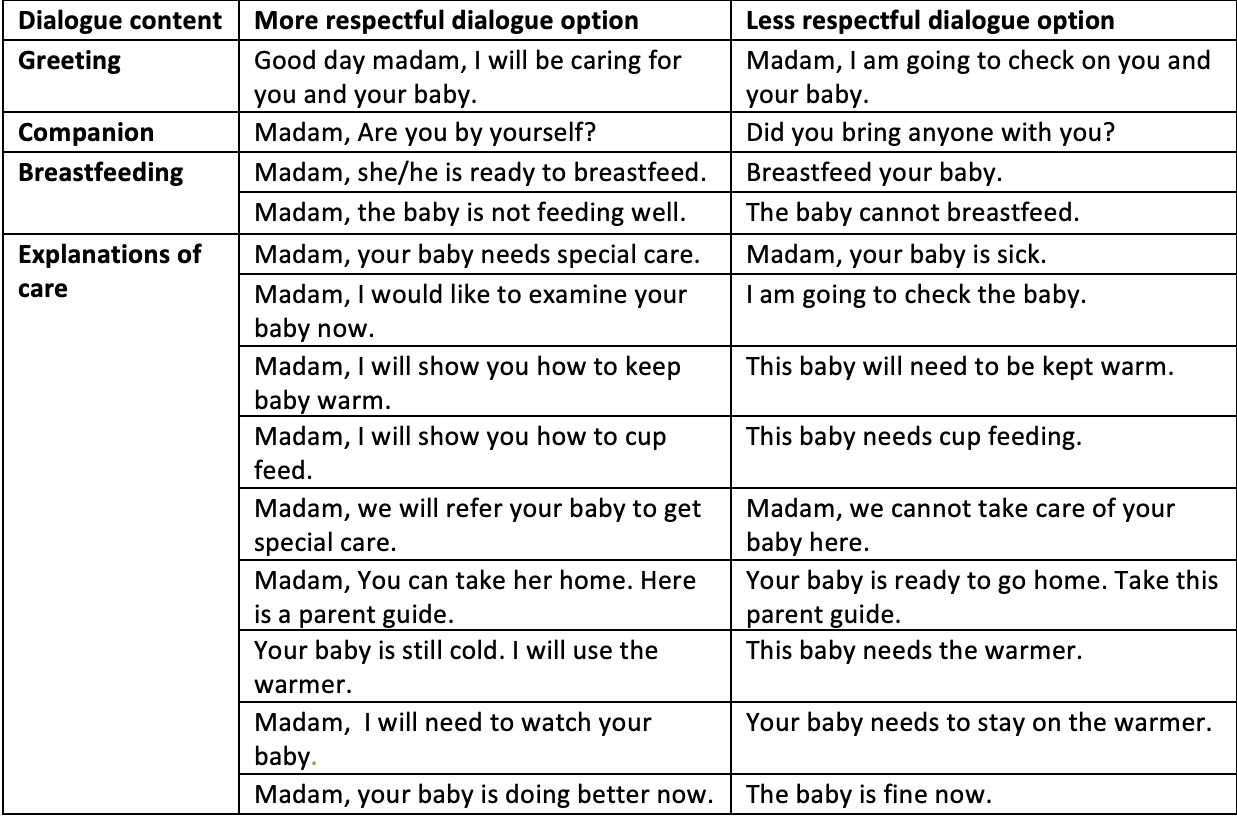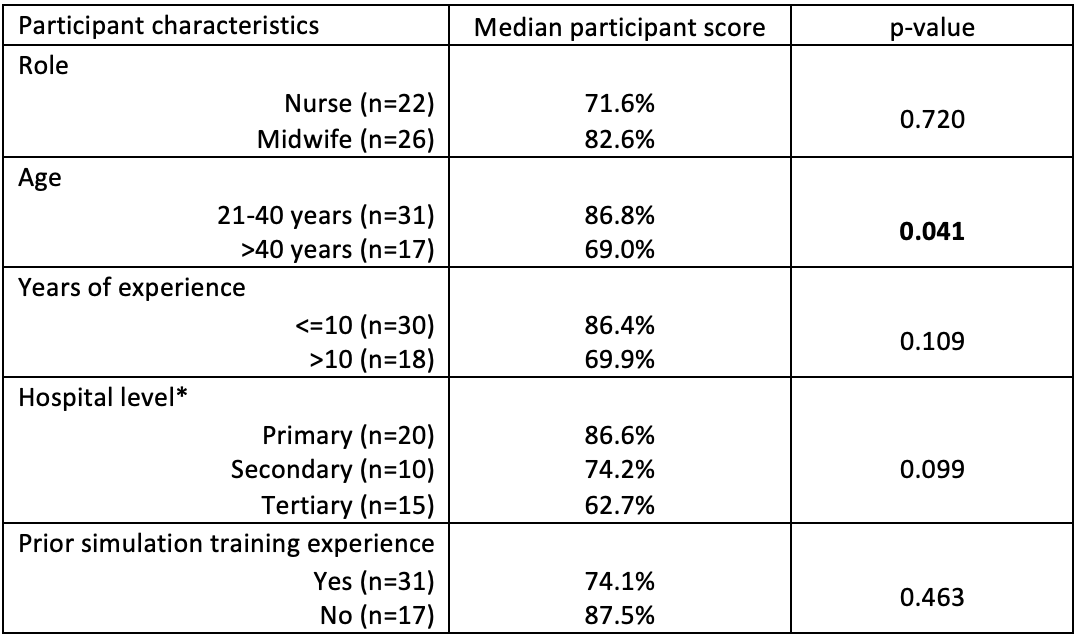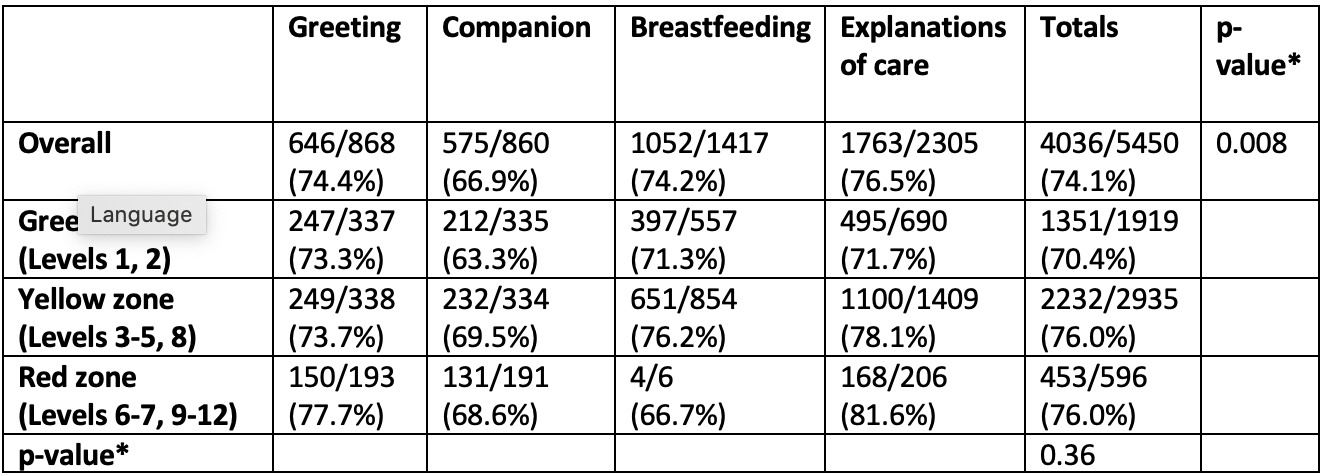Global Neonatal & Children's Health 4
Session: Global Neonatal & Children's Health 4
772 - Choosing Respectful Maternal and Newborn Care Dialogue – A Secondary Analysis from the Virtual Essential Newborn Care Study
Sunday, April 27, 2025
8:30am - 10:45am HST
Publication Number: 772.4254
Henna Shaikh, University of Washington School of Medicine, Seattle, WA, United States; Iretiola Bamikeolu. Fajolu, University of Lagos, Idi-Araba, Lagos, Nigeria; Sara Berkelhamer, University of Washington, Seattle, WA, United States; Daniel S. Hippe, Fred Hutchinson Cancer Center, Seattle, WA, United States; Christianah Olasumbo. Adeboboye, Lagos State Primary Health Care Board, Lagos, Lagos, Nigeria; OLAWUYI Adebimpe. ADEBIMPE, Lagos University Teaching Hospital idiaraba, Lagos University Teaching Hospital IDIARABA, Lagos, Nigeria; Ime Asangansi, ehealth4everyone, Abuja, Federal Capital Territory, Nigeria; Matthew Cook, University of Washington, Lynnwood, WA, United States; OMOLOLA Stella. FASOLA, Primary health care board, Salolo, Lagos, Nigeria; John Feltner, University of Washington School of Medicine, Seattle, WA, United States; Joseph D. Fisher, University of Washington School of Medicine, Seattle, WA, United States; Victoria Quach, University of Washington School of Medicine, Seattle, WA, United States; Cyril M. Engmann, University of Washington School of Medicine, Shoreline, WA, United States; Chinyere Ezeaka, University of Lagos, Lagos, Lagos, Nigeria; Rachel A.. Umoren, University of Washington, Seattle, WA, United States

Henna Shaikh, MD MPH (she/her/hers)
NICU Fellow
University of Washington School of Medicine
Seattle, Washington, United States
Presenting Author(s)
Background: Respectful maternal and newborn care (RMNC) is a human right and a core WHO quality framework component. RMNC includes explanations of care, which evidence indicates are frequently lacking, especially in busy, resource-constrained settings. Neonatal resuscitation and stabilization practice with the Virtual Essential Newborn Care (vENC) mobile application includes dialogue options for maternal communication. Whether vENC can be used to assess respectful communication is unknown.
Objective: To evaluate 1) the frequency of more respectful dialogue selections in vENC and 2) associations of dialogue selections with participant demographics, level complexity, and dialogue content.
Design/Methods: From 2022-23, eligible nurses and midwives at 23 hospitals in Lagos, Nigeria participated in a 2-day in-person Essential Newborn Care (ENC) course followed by 6 months of vENC. vENC scenarios were organized in sequentially more complex levels, each with more and less respectful dialogue options for interacting with the mother (Table 1). Participant scores based on the proportion of more respectful dialogue selections were compared across demographics using Mann-Whitney exact tests and Spearman’s rank correlation. The aggregate proportion of responses was compared across level complexity and dialogue content domains using generalized estimating equations based logistic regression.
Results: Of 5450 responses from 48 female participants, 4036 (74%) were the more respectful option. Participant scores ranged from 8-100% with median 79%. The proportion of more respectful selections was significantly greater among participants ≤40 years old (median 87% vs. 69%, p=0.041) and trended greater among those working in a primary health facility compared to secondary and tertiary facilities (median 87%, 74%, and 63% respectively, p=0.099) (Table 2). The proportions of more respectful selections varied significantly by dialogue content (p=0.008) but not by level complexity (p=0.36). Specifically, asking about a companion had the least frequent selection of the more respectful option (67%) compared to greeting (74%, p = 0.003), breastfeeding (74%, p = 0.028) and explanations of care (76%, p < 0.001) (Table 3).
Conclusion(s): These findings suggest that vENC could be used for assessment or training on respectful communication in maternal and newborn care. While most dialogue selections were more respectful, half of participants chose the less respectful option at least 20% of the time. Experienced providers may benefit from RMNC training that emphasizes respectful communication, particularly around inquiring about a companion.
Table 1. More and less respectful vENC dialogue options
 More and less respectful dialogue options were designated based on literature review of respectful communication.
More and less respectful dialogue options were designated based on literature review of respectful communication.Table 2. Participant dialogue selection scores according to demographic characteristics
 Participant score represents the proportion of more respectful dialogue selections out of total responses. Statistical comparisons were performed using Mann Whitney exact tests for two categories or Spearman’s rank correlation for more than two groups. *Hospital level comparison excludes 1 participant with missing hospital level value and 2 participants who denoted a private hospital.
Participant score represents the proportion of more respectful dialogue selections out of total responses. Statistical comparisons were performed using Mann Whitney exact tests for two categories or Spearman’s rank correlation for more than two groups. *Hospital level comparison excludes 1 participant with missing hospital level value and 2 participants who denoted a private hospital. Table 3. Associations between proportions of more and less respectful dialogue options and vENC scenario difficulty and dialogue content
 In each box, numerator represents the N of respectful responses and denominator represents the N of total responses.
In each box, numerator represents the N of respectful responses and denominator represents the N of total responses.*p-values are based on a two-factor (level complexity and communication domain) generalized estimating equations based logistic regression model. There was no significant interaction between the two factors (p = 0.47).

